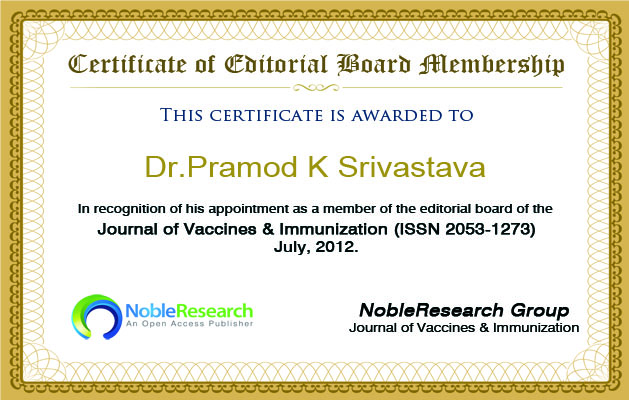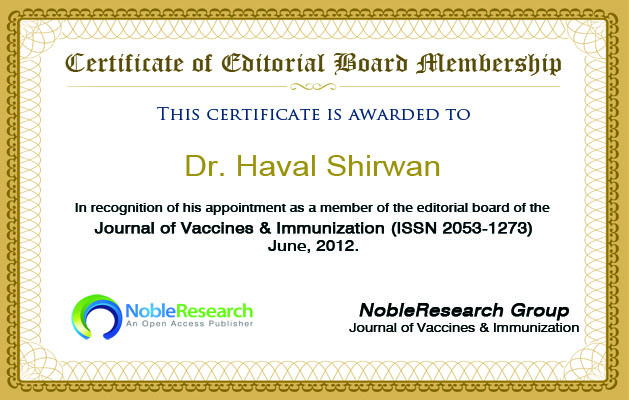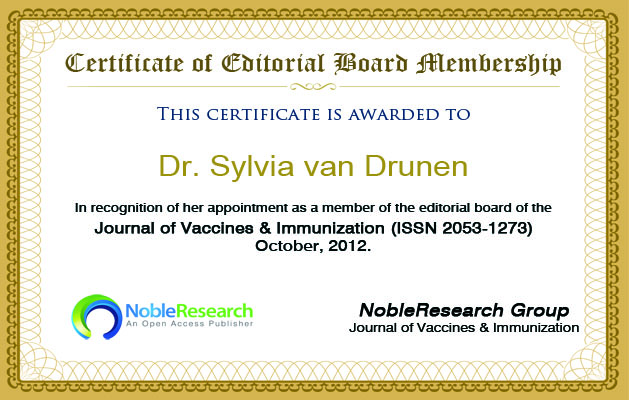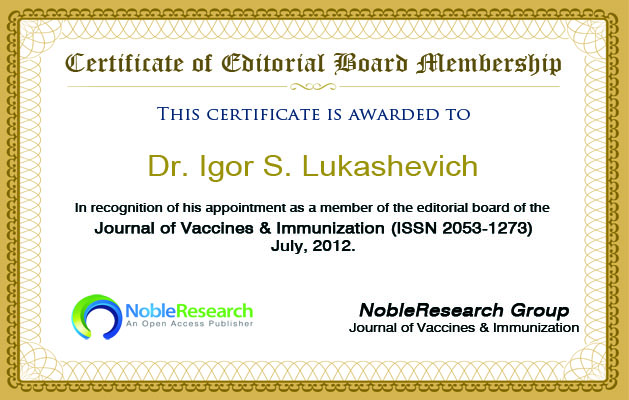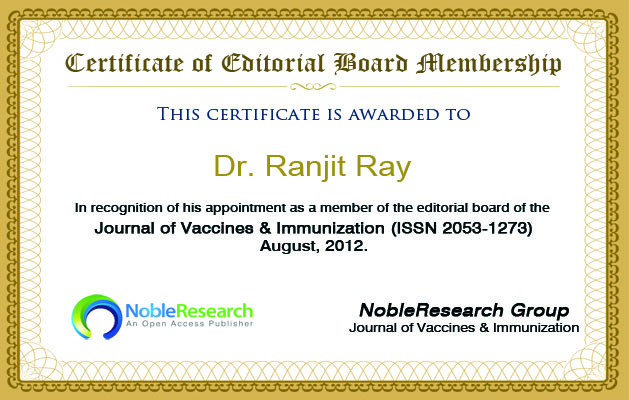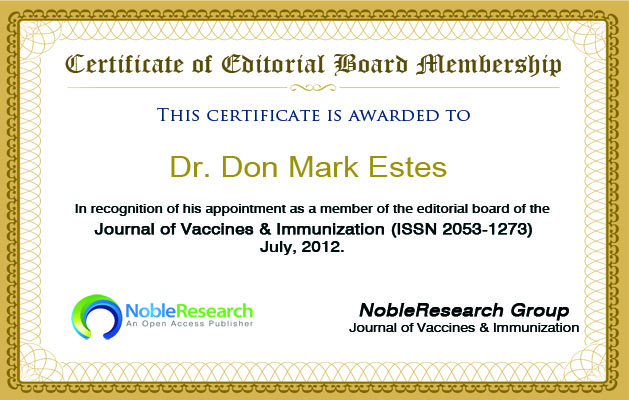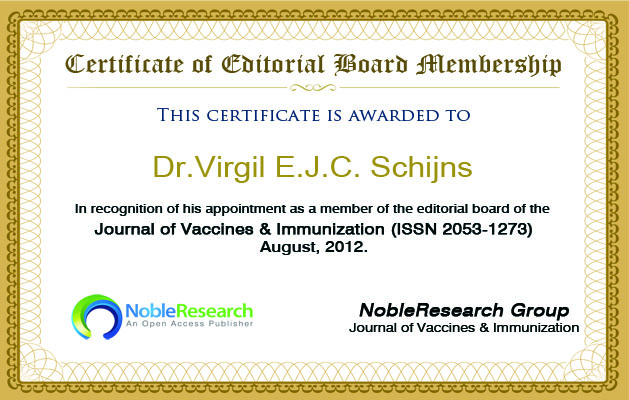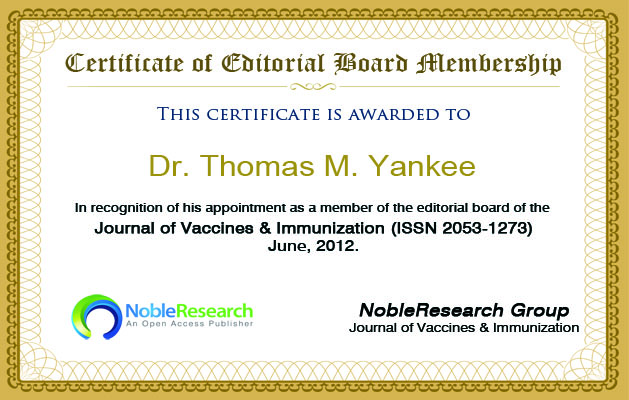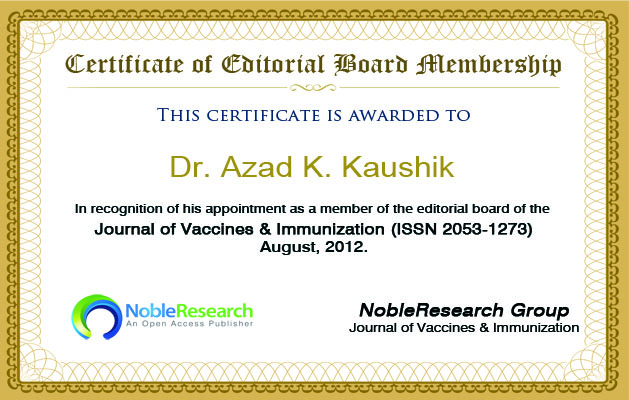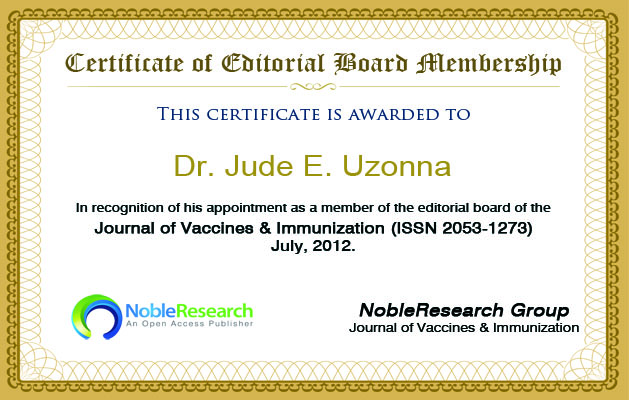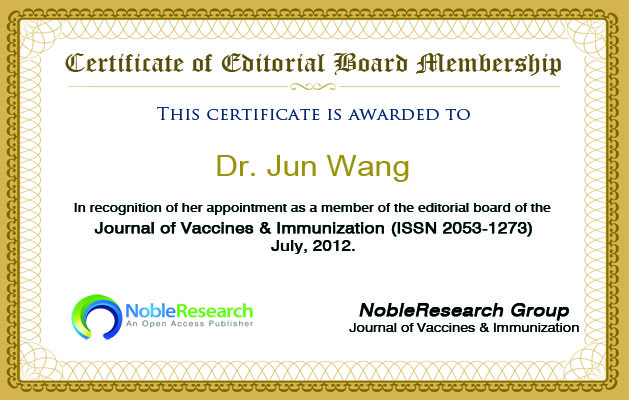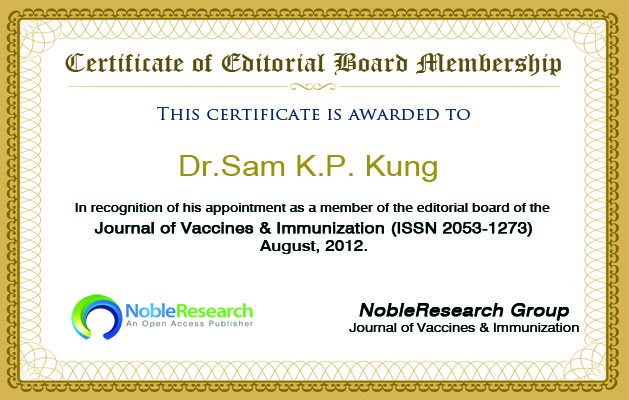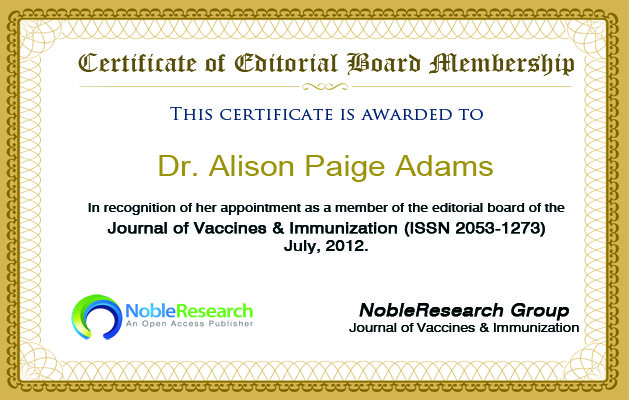
The email alerts service allows anyone who registers their email address to be notified via email when new content goes online.
Recommend this journal to your friend or library.
Manuscripts should be submitted online through our website or as an email attachment to the editorial office at editor.jvi@nobleresearch.org
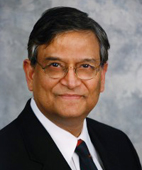
- Dr. Pramod K Srivastava, Professor,
- Department of Immunology,
- Chair-Experimental Oncology,
- Physicians Health Services Chair in Cancer Immunology,
- Director-Center for Immunotherapy of Cancer and Infectious Diseases,
- Director-Carole and Ray Neag Comprehensive Cancer Center,
- University of Connecticut School of Medicine,
- Farmington, USA.
- BiographyOpen or Close
Dr. Pramod K Srivastava, is the Director of the Carole and Ray Neag Comprehensive Cancer Center at the University of Connecticut School of Medicine where he is a Professor of Medicine and Immunology. He holds the Northeastern Utilities Chair in Experimental Oncology. His laboratory has identified a powerful role for heat shock proteins in regulating autoimmune processes. Dr. Srivastava has published nearly 200 papers including many in the top tier of academic journals. In addition, he is an inventor (most often the sole inventor) on nearly a hundred awarded US and foreign patents. He serves and has served in the past on numerous federal study sections of the NIH and Department of Defense. He is a co-founder of several biotechnology companies including Agenus (AGEN), Ikonisys, and Life Science Pharmaceuticals.
- ExpertiseOpen or Close
Dr. Pramod Srivastava's major scientific contribution has been the discovery of heat shock proteins as peptide chaperones and the elucidation of the fundamental roles of heat shock protein-peptide complexes in antigen presentation and cross-priming. Dr. Srivastava's work on the immunogenicity of heat shock protein-peptide complexes became the basis of the first therapeutic cancer vaccine approved anywhere in the world (Russia, 2008). Further development of this vaccine for approvals in the US and European Union is in progress. The heat shock protein-peptide complexes are also being developed clinically for vaccines against infectious diseases such as genital herpes.
- CertificateOpen or Close
- PublicationsOpen or Close
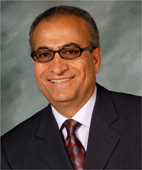
- Dr. Haval Shirwan, Professor,
- Department of Microbiology and Immunology,
- Director-Molecular Immunomodulation Program,
- Institute for Cellular Therapeutics,
- Dr. Michael and Joan Hamilton Endowed Chair in Autoimmune Disease,
- University of Louisville, USA.
- BiographyOpen or Close
Dr. Shirwan is a professor of Microbiology and Immunology, Dr. Michael and Joan Hamilton Endowed Chair in Autoimmune Disease and the Director of the Molecular Immunomodulation Program at the Institute for Cellular Therapeutics. He conducted his graduate studies at the University of California in Santa Barbara, CA, and postdoctoral studies at California Institute of Technology in Pasadena, CA. Dr. Shirwan’s research focuses on the modulation of immune system for the treatment of immune-based diseases with particular focus on type 1 diabetes, transplantation, and vaccines. He pioneered the ProtEx™ technology with his collaborator Dr. Esma S. Yolcu as a safe, efficient, and practical alternative to DNA-based immune gene therapy to generate proprietary recombinant proteins with potent immune activities. Dr. Shirwan is an inventor of 16 issued patents, scientific founder of a biotech company, and published >170 peer-reviewed papers, book chapters, and abstracts.
- ExpertiseOpen or Close
The primary focus of his translational research program in immunomodulation is to develop novel vaccines for the prevention and treatment of various immune based disorders ranging from infections, cancer, graft rejection, and autoimmunity. To achieve this goal,they recently pioneered a patented platform technology designated as ProtEx™ that accomplishes two important goals. First, it allows for the generation of recombinant novel immunological proteins by fusing the functional domain of any ligand of interest with a modified form of core streptavidin (SA). The chimeric proteins exist as tetramers and higher structures, owing to the physical properties of SA, and as such have potent immune functions in soluble forms by crosslinking their respective receptors on the surface of immune cells for effective signal transduction.
- CertificateOpen or Close
- PublicationsOpen or Close
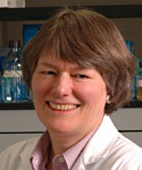
- Dr. Sylvia van Drunen Littel-van den Hurk,
- Professor of Microbiology & Immunology,
- Program Manager and Research Scientist,
- Viral Pathogenesis & Vaccine Development Group,
- College of Medicine,VIDO-Intervac,
- University of Saskatchewan,
- Canada.
- BiographyOpen or Close
Dr. Sylvia van Drunen Littel-van den Hurk is Professor of Microbiology & Immunology in the College of Medicine, University of Saskatchewan, Canada. She also a Research Fellow in VIDO-Intervac (Vaccine and Infectious Disease Organization-International Vaccine Centre), where she is the program manager of the viral pathogenesis & vaccine development group. She received her B.Sc. and M.Sc. at the University of Wageningen in the Netherlands and a Ph.D. at the University of Saskatchewan. She has published over 170 peer-reviewed manuscripts, reviews and book chapters, and 8 patents with 1 pending. She has mentored >35 graduate students and post-doctoral fellows. Her research is/has been funded by provincial, national (Canadian Institutes for Health Research, Natural Sciences and Engineering Council) and international (Bill and Melinda Gates Foundation) granting agencies. Dr. van den Hurk serves as external or internal reviewer in several national and international grant review panels.
- ExpertiseOpen or Close
Dr. van den Hurk’s research interests include molecular pathogenesis of bovine herpes virus-1 (BHV-1), respiratory syncytial virus (RSV) and hepatitis C virus (HCV), and the development of novel live, protein, DNA and dendritic cell vaccine formulations. Dr. van den Hurk is studying the structure and functions of the BHV-1 tegument proteins, which allows for the identification of virulence factors that can be deleted as an approach to development of attenuated vaccines. As there is no vaccine yet, Dr. van den Hurk developed novel vaccine formulations that elicit potent systemic and mucosal immunity in neonates, the major target population for RSV vaccination. Dr. van den Hurk’s research group was one of the first to demonstrate the efficacy of DNA vaccines in a large animal species, cattle. Dr. van den Hurk established the potential efficacy of a dendritic cell vaccine in mouse models, and is applying this approach using dendritic cells derived from chronic hepatitis C patients.
- CertificateOpen or Close
- PublicationsOpen or Close
- Dr. Igor S. Lukashevich, Professor,
- Department of Pharmacology and Toxicology,
- Center for Predictive Medicine,
- NIH Regional Biocontainment Lab,
- University of Louisville,
- Louisville, USA.
- BiographyOpen or Close
Dr. Igor S. Lukashevich is a Professor in School of Medicine at Department of Pharmacology and Toxicology and Center for Predictive Medicine, University of Louisville. Dr. Lukashevich received his MD degree from Minsk Medical School (Belarus) and PhD and DSc (Doctor of Sciences) Degrees in Virology from Institute of Virology, Academy of Medical Sciences in Moscow (Russia). His post-doctoral training was focused on molecular biology of viral hemorrhagic fevers (CDC, Atlanta, GA, USA; Institute of Tropical Medicine, Antwerp, Belgium; University of Hamburg, Heinrich-Pette Institute of Experimental Virology and Immunology). From 1990-1993 he served as an invited expert on hemorrhagic fever viruses at University of Conakry/IRBAG, Guinea, and as a consultant of German Agency for Technical Cooperation (GTZ). From 2001 till 2011 he served as Assistant, and then Associate Professor in Institute of Human Virology, University of Maryland, Baltimore, MD, USA.
- ExpertiseOpen or Close
Dr. Igor S. Lukashevich research interest includes molecular biology and pathogenesis of viral hemorrhagic fevers. His current projects mostly focus on innovative approaches in vaccine research and development: rational design of live-attenuated vaccines, recombinant YF17D-based vaccines; advanced alphavirus replicon technology; infectious DNA vaccines; and his target infectious are: Lassa Fever and South American Hemorrhagic Fevers, Chikungunya, Yellow Fever, and Venezuelan Equine Encephalitis.
- CertificateOpen or Close
- PublicationsOpen or Close
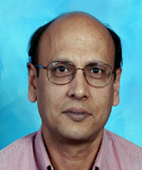
- Dr. Ranjit Ray, Professor,
- Department of Internal Medicine & Molecular Microbiology & Immunology,
- Division of Infectious Diseases,Allergy & Immunology
- Center for Vaccine Development,
- Edward A. Doisy Research Center,
- Saint Louis University School of Medicine,
- Saint Louis, USA.
- BiographyOpen or Close
Dr. Ranjit Ray is a Professor in Department of Internal Medicine, Division of Infectious Diseases, Allergy & Immunology, Saint Louis University, Saint Louis. Dr. Ray graduated with a B.Sc. degree from the University of Calcutta, India in 1972, and received his M.Sc & Ph.D in Biochemistry from the same institution in 1974 and 1982 respectively. He joined as a post-doctoral fellow in the Department of Microbiology, University of Alabama at Birmingham in 1983, and conducted research on the envelope glycoproteins of human parainfluenza viruses, a major causative agent for respiratory infection in children. After completion of post-doctoral training, he joined Secretech, Inc., Birmingham, AL, as a senior research scientist and headed a research group for vaccine development.
- ExpertiseOpen or Close
Dr. Ray made significant contributions in the understanding of basic knowledge on human parainfluenza virus and the potential use of viral envelope glycoproteins as a subunit vaccine. Dr. Ray has worked on various aspects of respiratory and hepatitis viruses for more than 25 years. Dr. Ray made significant contributions in the advancement of basic knowledge on human paramyxovirus biology, and in understanding the molecular mechanism of hepatitis C virus entry and pathogenesis. Dr. Ray’s laboratory was the first to report the pleotropic functions and oncogenic potential of HCV core protein. Dr. Ray has worked in understanding host-virus interactions and HCV entry employing pseudotypes. His group has defined the role of glycosaminoglycans on hepatocytes as an attachment receptor of HCV. He has examined a number of immunological aspects of HCV, including innate and humoral immune responses, and dendritic cell maturation.
- CertificateOpen or Close
- PublicationsOpen or Close

- Dr. Don Mark Estes, Professor,
- Department of Infectious Diseases,
- Fred L. Davison Chair in Biomedical Sciences,
- University of Geogia College of Veterinary Medicine,
- Veterinary Medicine,
- Athens, USA.
- BiographyOpen or Close
Dr. Don Mark Estes is a Professor at Department of Infectious Diseases and Fred L. Davison Chair in Biomedical Sciences, University of Georgia College of Veterinary Medicine, Athens. Dr. Mark Estes graduated with a BS degree in Microbiology from Texas Tech University Lubbock, TX in 1982 and received his PhD in Genetics from the Texas A&M University College Station, TX in 1988. Dr. Mark Estes got different academic grades few of them are Director-Program in Immunology, Institute for Human Infections and Immunity, University of Texas Medical Branch, Galveston, TX 77555 (2006-2010); Associate Member-Graduate Faculty-Experimental Pathology, Dept. of Pathology, University of Texas Medical Branch, Galveston, TX 77555 (2003-2010) and Professor (Tenured), School of Medicine, Department of Pediatrics, University of Texas Medical Branch, Galveston, TX 77555 (2003-2010).
- ExpertiseOpen or Close
Dr. Mark Estes’s laboratory focuses on immunoregulatory mechanisms in infection and cancer. These interests are relatively broadly defined in several model systems in man and animals. Our long term goals are to develop improved immunotherapeutics and vaccines. Dr. Mark Estes and his team members are evaluating a soluble factor derived from dendritic cells which plays a key role in promoting IgA responses by B cells. Several applications are possible to vaccine development and targeting in addition to selective immunodeficiencies. His team second area is to investigate the role of sex steroid hormones and naturally occurring analogues on the innate and adaptive immune response to infection, allergy/asthma, vaccination and cancer. His team third project is to investigate various vaccination schemes to improve memory and effector responses by CD8+ T cells to subunit vaccination for tuberculosis in addition to better prognostic markers for vaccine efficacy.
- CertificateOpen or Close
- PublicationsOpen or Close
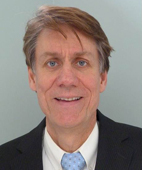
- Dr. Virgil E.J.C. Schijns, Professor,
- Cell Biology & Immunology group,
- Special Professor in Immunology and Virology,
- North Carolina State University,
- Special professor immune Intervention,
- Wageningen University,
- Netherlands.
- BiographyOpen or Close
Dr. Virgil E.J.C. Schijns is Professor in Cell Biology & Immunology group, Wageningen University, 6708 WD Wageningen. Dr. Schijns received his Master’s degree in Medical Biology from Utrecht University, Utrecht in 1986 and his Ph.D. from the same institution in 1990. Dr. Schijns some of professional appointments are Chief Scientific Officer at ERC Belgium, Isnes, Belgium (2011 to present); Chief Technology Officer, Vice-president at a small biotech spin-off from Utrecht University (2008 to 2011); Special professor immune Intervention, Wageningen University and Research center (2008 to present); Special Professor in Immunology and Virology at North Carolina State University (NCSU), Raleigh. Department of Population Health and Pathobiology (2002 to present) and Head of newly formed Department for Vaccine Technology and Immunology (VTI), AKZO NOBEL (1999 to 2008).
- ExpertiseOpen or Close
Dr. Schijns’s major research interests are immunomodulation by natural occurring inhibitors of the developing immune reaction for the rational design of new vaccines. Dr. Schijns’s research focus on activation of the immune system, for the induction of specific immunity is dependent on proper signals, like soluble cytokines and membrane-expressed receptors, received in a strict time-related order. Based on the knowledge of the initiation of immune responses, new vaccines and immune potentiators can be designed in a rational way. Several new options have been developed and will be applied in model systems to increase basic understanding of the immunological mechanisms of action and for the development of new generations of vaccines to be used in different animal species and ultimately in humans.
- CertificateOpen or Close
- PublicationsOpen or Close
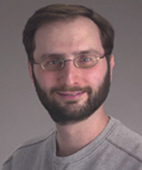
- Dr. Thomas M. Yankee, Associate Professor,
- Department of Microbiology,
- Department of Molecular Genetics,
- Department of Immunology,
- University of Kansas Medical Center,
- Kansas City,
- USA.
- BiographyOpen or Close
Dr. Yankee is an Associate professor ,received his Pharm.D. from the University of Illinois at Chicago in 1995. In 1999 he completed his Ph.D. from the Department of Medicinal Chemistry and Molecular Pharmacology at Purdue University in West Lafayette, Indiana. He then joined the laboratory of Dr. Edward Clark at the University of Washington in Seattle, Washington. In 2005, he joined the faculty at the University of Kansas Medical Center in Kansas City, Kansas as an Assistant Professor. Dr. Yankee was promoted to Associate Professor in 2011. Dr. Yankee’s primary research interests include the signaling pathways that regulate T cell development and activation.
- ExpertiseOpen or Close
Dr. Yankee research interest emphasizes on the function of an adaptor protein critical for T cell signaling called Gads. His team have developed a mouse line that lacks Gads expression and found that Gads is critical for T cell development and homeostasis. Further, they observed that homeostasis in CD4 + T cells and CD8 + T cells are differentially regulated and Gads is particularly critical for CD4 + T cell homeostasis.
- CertificateOpen or Close
- PublicationsOpen or Close
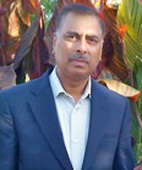
- Dr. Azad K. Kaushik, Associate Professor,
- Department of Immunology ,
- Department of Molecular & Cellular Biology ,
- University of Guelph,
- Ontario, Canada.
- BiographyOpen or Close
Dr. Azad K. Kaushik is an Associate Professor of Immunology at Department of Molecular & Cellular Biology, University of Guelph, Guelph, Ontario, Canada. Dr. Kaushik received his B.V.Sc. from Haryana Agricultural University, Hisar, India in 1976 and his M.V.Sc. in Microbiology and Immunology from same institution in 1978. He has received his D. Sc. (Docteur es Science) from Pasteur Institute, University of Paris VII, Paris, France. Dr. Kaushik’s some of professional appointments are Assistant Research Professor-Department of Medical Biochemistry, Faculty of Medicine in University of Geneva, Geneva, Switzerland; Assistant Professor-Department of Pathobiology, University of Guelph, Ontario, Canada and Visiting Professor and Greenberg Scholar, Oklahoma Medical Research Foundation, Oklahoma City, USA. Dr. Kaushik has two patents and has co-edited one book and authored >150 peer reviewed articles, book chapters and abstracts.
- ExpertiseOpen or Close
Dr. Kaushik’s major research interests are antibody genetics, engineering and transgenesis, vaccine development, autoimmunity and systemic autoimmune disease. His research led to identification of genetic elements encoding autoantibodies and the role of B-cell selection in the origin of pathogenic IgM autoantibodies involved in systemic autoimmune disease. Studies of the construction of humoral immune system in cattle in his laboratory demonstrated limited germline diversity requiring alternate antibody diversification strategies where largest sized antibody known to exist in a species is generated via exceptionally long CDR3H (up to 61 amino acids). The research on structural and functional aspects of antibody aims at engineering, e.g., construction of single chain Fv, novel vaccines, immunodiagnostics and therapeutics.
- CertificateOpen or Close
- PublicationsOpen or Close
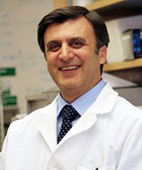
- Dr. Jude E. Uzonna, Associate Professor,
- Department of Immunology,
- Department of Medical Microbiology,
- Faculty of Medicine,
- Manitoba Health Research Chair,
- University of Manitoba, Manitoba, Canada.
- Manitoba, Canada.
- BiographyOpen or Close
Dr. Masoud H. Manjili is an Associate Professor of Microbiology & Immunology, Virginia Commonwealth University (VCU) School of Medicine, and Member of Massey Cancer Center. Dr. Manjili received a DVM degree from the University of Tehran, and a PhD degree in Immunology from the University of Sydney, Australia. He completed his postdoctoral fellowship in tumor immunology at Roswell Park Cancer Institute, and was promoted to an Affiliate Member in 2003. Dr. Manjili joined the faculty at VCU in 2004 as a collateral track Assistant Professor, he was promoted to tenure-track Assistant professor in 2005, and became Associate Professor with tenure in 2012.
- ExpertiseOpen or Close
Dr. Manjili’s research interests are focused on two major areas: 1) immunotherapy of cancer and 2) breast cancer biomarkers. Ongoing research projects in his lab include: In situ immunization strategy together with ex vivo re-programming of tumor-sensitized T cells, NKT/NK cells for adoptive cell therapy (ACT) of breast cancer. Understand molecular mechanisms of immune-mediated tumor escape and recurrence. Develop an immune function gene-based biomarker for breast cancer prognosis. Identification of T cell clones involved in mediating graft versus host disease (GVHD) or graft versus tumor (GVT) effects in patients with hematologic malignancies.
- CertificateOpen or Close
- PublicationsOpen or Close
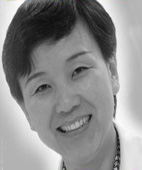
- Dr. Jun Wang, Associate Professor,
- Department of Microbiology,
- Department of Immunology ,
- Department of Pediatrics,
- Canadian Centre for Vaccinology,
- Dalhousie University,
- Halifax, Canada.
- BiographyOpen or Close
Dr. Jun Wang is an Associate Professor at Department of Microbiology & Immunology and Pediatrics, Canadian Centre for Vaccinology, Dalhousie University, Canada. Dr. Wang received her MD from department of Medicine, Jin Ling Professional University, Nanjing, China and she was awarded with doctoral degree in molecular immunology, virology and inflammation from McMaster University, Ontario, Canada. Dr. Wang previously held positions include Postdoctoral fellow-Department of Pathology & Molecular Medicine, Division of Infectious Diseases, Centre for Gene Therapeutics, McMaster University, Ontario, Canada; Sr. Scientist-Vaccine Assessment and Production, Aeras Global TB Vaccine Foundation, Rockville, MD, USA and Sr. Research Scientist, Vaccinex Inc., Rochester, NY, USA.
- ExpertiseOpen or Close
Dr. Jun Wang’s research interests are to develop effective and safe mucosal vaccines against Chlamydia species based on recombinant gene delivery systems.To pursue basic studies to fully understand immune responses, particularly CD4 T cell responses to intracellular bacterial infection, and to translate basic knowledge into the discovery of human-compatible immune adjuvants and the development of robust immunoassays for evaluating new vaccines in animal models and eventually in human clinical trials.
- CertificateOpen or Close
- PublicationsOpen or Close
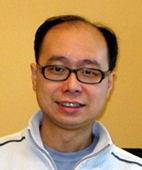
- Dr. Sam K.P. Kung, Associate Professor,
- Laboratory of Innate Immunobiology,
- Department of Immunology,
- University of Manitoba,
- Winnipeg, Canada.
- BiographyOpen or Close
Dr. Kung is an Associate Professor in the Department of Immunology, University of Manitoba, Canada. He received his B.Sc, M’Phil degrees in Biochemistry at the University of Hong Kong, Hong Kong, and a Ph.D degree in Immunology at the University of Toronto, Canada. He did his postdoctoral training in HIV-1 retrovirology and HIV-1 based lentiviral gene therapy vectors at University of California, Los Angeles, USA. Dr. Kung was the recipient of the Manitoba Medical Service Foundation Basic Science Career Development Research Award. He is currently the project leader of the Laboratory of Innate Immunobiology funded by Canada Foundation for Innovation, the Biomedical Functionality Resource and the Lentiviral Vector Production Core Platform established by the Faculty of Medicine, University of Manitoba.
- ExpertiseOpen or Close
Dr. Kung’s research interests are improper regulation of immune system accounts for a large number of immune disorders. Innate immunity is the host’s first line of defense, and is critically involved in determining the magnitude and nature of subsequent T cell and antibody mediated immune responses. Dr. Kung’s laboratory at University of Manitoba studies two major cellular components of innate immunity- natural killer cells and dendritic cells. These two cell types exert their immunological functions independently. In addition, they can interact to regulate the cellular activities of each other. Dr. Kung’s aim at identifying factors that (i) define dendritic cell development and functions; (ii) regulate natural killer cell differentiation and acquisition of target specificity, and also (iii) regulate natural killer cell-dendritic cell crosstalks. He is interested in developing lentiviral vector-based immunotherapy of cancer and immunological diseases.
- CertificateOpen or Close
- PublicationsOpen or Close
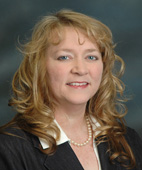
- Dr. A. Paige Adams, Assistant Professor,
- Department of Pathology,
- University of Texas Medical Branch,
- Galveston, Texas,
- USA.
- BiographyOpen or Close
Dr. Adams currently serves as an Assistant Professor in the Department of Pathology at the University of Texas Medical Branch (UTMB). Dr. Adams received her Bachelor of Science and Doctor of Veterinary Medicine degrees from Texas A&M University. Dr. Adams received a Ph.D. in immunology from Cornell University and postdoctoral training in infectious diseases, specifically arboviruses, at the UTMB. Since joining the faculty at the UTMB, her studies have focused on the pathogenesis of and vaccine development for several alphaviruses, including Venezuelan (VEEV) and eastern (EEEV) equine encephalitis viruses, and she has recently extended this work to include the arthralgic alphavirus, chikungunya virus (CHIKV). Dr. Adams has been the recipient of several NIH grants, has published 28 peer-reviewed papers and book chapters, and has served as a reviewer for at least five scientific journals.
- ExpertiseOpen or Close
Dr. Adams’s research interests are discovery and characterization of novel therapeutic agents for human and animal viral pathogens. Immunopathology and infectious disease pathogenesis of alphaviruses in rodent, equine, and non-human primate animal models. Innate and adaptive immune responses to arboviruses (including alphaviruses and flaviviruses). Vaccine development for biodefense and emerging infectious diseases. Phylogenetics and evolutionary processes of arboviruses as they relate to emergence.
- CertificateOpen or Close
- PublicationsOpen or Close




